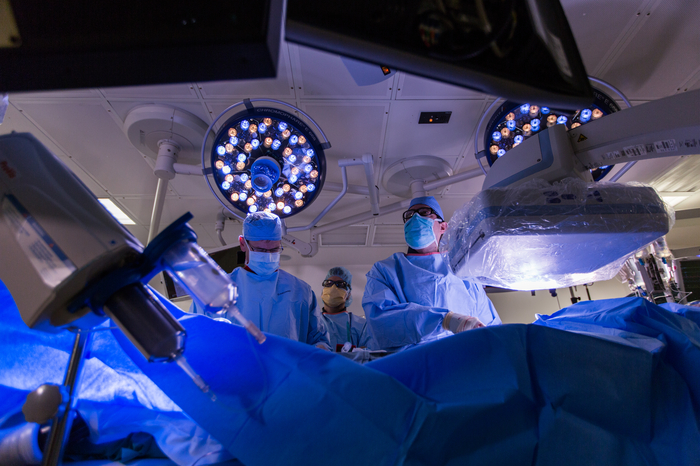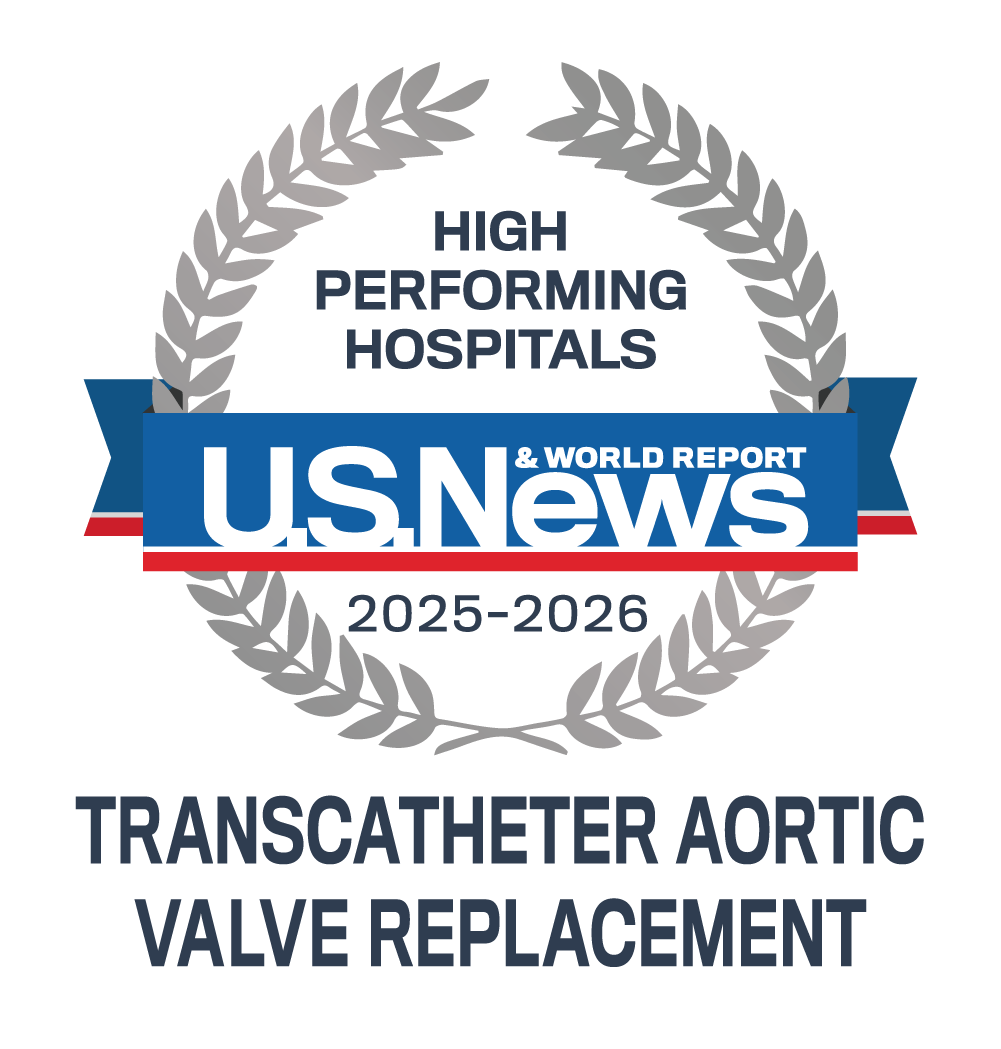TAVR and Heart Valve Treatments
TAVR and Heart Valve Treatments
TAVR and Heart Valve Treatments
Transcatheter aortic valve replacement (TAVR) has become one of the most common heart valve treatments. It replaces your aortic valve without open surgery.
TAVR has helped millions of people with aortic stenosis regain energy and enjoy life again. However, it's not the right treatment for everyone.
We have many ways to treat heart valve disease, including heart valve surgery. We also treat problems with other heart valves, including mitral valve regurgitation.
Transcatheter aortic valve replacement (TAVR) has become one of the most common heart valve treatments. It replaces your aortic valve without open surgery.
TAVR has helped millions of people with aortic stenosis regain energy and enjoy life again. However, it's not the right treatment for everyone.
We have many ways to treat heart valve disease, including heart valve surgery. We also treat problems with other heart valves, including mitral valve regurgitation.
Heart valve treatments treat problems with one or more of your heart’s 4 valves. You may need treatment for:
- Regurgitation: Valves that leak
- Stenosis: Valves that have narrowed
- Atresia: Valves that aren’t formed properly
We can repair or replace heart valves that aren’t working properly. For some people, we can use interventional heart procedures instead of surgery. These procedures avoid open-heart surgery and have a much quicker recovery.
The conditions we see most include:
- Aortic stenosis
- Mitral valve disease
- Tricuspid valve disease
Learn more about heart valve disease, including symptoms and diagnosis.
What is TAVR?
TAVR is an interventional heart procedure that treats aortic valve stenosis (narrowing). If your aortic valve gets too narrow, blood can’t flow as it should. It can make you feel tired and often short of breath.
Instead of open surgery and large incisions, TAVR uses a thin, flexible tube called a catheter through a small cut to access a blood vessel.
To perform TAVR, the doctor makes a small cut in your leg’s major artery near your groin. Then, they thread the catheter until it reaches your heart.
The new valve is inside the catheter, and the doctor places it inside the failing valve. The new one takes over and begins doing the work of your valve. Most people feel better almost immediately and go home the next day.
What is MitraClip?
MitraClip is an interventional heart procedure that treats mitral valve regurgitation.
Mitral valve regurgitation (leaking) happens when the mitral valve doesn’t close properly. This can make blood flow backward. You might notice feeling fatigued a lot, and you might have heart palpitations.
The MitraClip procedure helps prevent the valve from leaking. Like TAVR, it's catheter-based. A catheter is a thin, flexible tube that fits inside an artery.
The doctor makes small pokes in your leg’s major artery near your groin. Then, they thread the catheter until it reaches your heart. The MitraClip device is in the catheter; once it’s clipped to your mitral valve, it helps stop the leaking.
What is heart valve replacement surgery?
Traditionally, heart valve replacement surgery has meant open-heart surgery. The surgeon makes a large incision in your chest. They replace the damaged valve with a new one.
Replacing the aortic valve with surgery is surgical aortic valve replacement (SAVR). For some people, heart valve surgery may be a better option than TAVR.
We also perform less invasive surgeries for some conditions. For example, we can surgically repair mitral valves and tricuspid valves using only small incisions.
What Are Heart Valve Treatments?
Heart valve treatments treat problems with one or more of your heart’s 4 valves. You may need treatment for:
- Regurgitation: Valves that leak
- Stenosis: Valves that have narrowed
- Atresia: Valves that aren’t formed properly
We can repair or replace heart valves that aren’t working properly. For some people, we can use interventional heart procedures instead of surgery. These procedures avoid open-heart surgery and have a much quicker recovery.
The conditions we see most include:
- Aortic stenosis
- Mitral valve disease
- Tricuspid valve disease
Learn more about heart valve disease, including symptoms and diagnosis.
What is TAVR?
TAVR is an interventional heart procedure that treats aortic valve stenosis (narrowing). If your aortic valve gets too narrow, blood can’t flow as it should. It can make you feel tired and often short of breath.
Instead of open surgery and large incisions, TAVR uses a thin, flexible tube called a catheter through a small cut to access a blood vessel.
To perform TAVR, the doctor makes a small cut in your leg’s major artery near your groin. Then, they thread the catheter until it reaches your heart.
The new valve is inside the catheter, and the doctor places it inside the failing valve. The new one takes over and begins doing the work of your valve. Most people feel better almost immediately and go home the next day.
What is MitraClip?
MitraClip is an interventional heart procedure that treats mitral valve regurgitation.
Mitral valve regurgitation (leaking) happens when the mitral valve doesn’t close properly. This can make blood flow backward. You might notice feeling fatigued a lot, and you might have heart palpitations.
The MitraClip procedure helps prevent the valve from leaking. Like TAVR, it's catheter-based. A catheter is a thin, flexible tube that fits inside an artery.
The doctor makes small pokes in your leg’s major artery near your groin. Then, they thread the catheter until it reaches your heart. The MitraClip device is in the catheter; once it’s clipped to your mitral valve, it helps stop the leaking.
What is heart valve replacement surgery?
Traditionally, heart valve replacement surgery has meant open-heart surgery. The surgeon makes a large incision in your chest. They replace the damaged valve with a new one.
Replacing the aortic valve with surgery is surgical aortic valve replacement (SAVR). For some people, heart valve surgery may be a better option than TAVR.
We also perform less invasive surgeries for some conditions. For example, we can surgically repair mitral valves and tricuspid valves using only small incisions.
You and your doctor will talk about which heart valve treatment is right for you, including:
- Surgical repair
- Surgical replacement
- Interventional procedures like TAVR and MitraClip
Interventional procedures like TAVR were originally only for older people who weren’t strong enough for open-heart surgery. Now, TAVR is available for people of all ages. However, it still isn’t the best option for everyone with aortic valve stenosis.
It also matters when you repair or replace your heart valve. Untreated heart valve disease can make your heart work too hard. This can lead to heart failure.
However, not everyone has severe symptoms of heart valve disease. For example, if you have mild aortic stenosis, you may not have breathing problems or fatigue. Following up regularly with your cardiologist to monitor your valve condition is important.
In other words, you don’t want to replace your valve too soon. But you also don’t want to wait too long.
Is Heart Valve Treatment Right for Me?
You and your doctor will talk about which heart valve treatment is right for you, including:
- Surgical repair
- Surgical replacement
- Interventional procedures like TAVR and MitraClip
Interventional procedures like TAVR were originally only for older people who weren’t strong enough for open-heart surgery. Now, TAVR is available for people of all ages. However, it still isn’t the best option for everyone with aortic valve stenosis.
It also matters when you repair or replace your heart valve. Untreated heart valve disease can make your heart work too hard. This can lead to heart failure.
However, not everyone has severe symptoms of heart valve disease. For example, if you have mild aortic stenosis, you may not have breathing problems or fatigue. Following up regularly with your cardiologist to monitor your valve condition is important.
In other words, you don’t want to replace your valve too soon. But you also don’t want to wait too long.
Your journey will depend on your heart valve condition and type of treatment.
At Carilion, we’ll be with you every step of the way. We'll be your heart care partner from diagnosis through cardiac rehab and beyond.
What to expect with TAVR
Before TAVR, you’ll need certain imaging tests. These include an echocardiogram of your heart and CT scan to plan the procedure.
Your care team will give you specific instructions about when to stop eating and taking medicines, typically the day before. Once at the hospital, we’ll prep you for the procedure.
The procedure usually takes about an hour. You’ll be sedated but awake. You may feel pressure but shouldn’t feel any pain.
When the procedure is over, we’ll take you to post-anesthesia recovery. After catheter-based procedures, it’s important to lie flat for several hours. We’ll get you up as soon as it’s safe.
You’ll spend the night in the cardiac unit and likely go home the next day. You’ll have some activity restrictions in the weeks after. Most people recover very quickly and feel the benefit immediately.
With TAVR, you qualify to participate in our cardiac rehab program. Cardiac rehab is an exercise program done under medical supervision that helps you recover and strengthen your heart.
What to expect with heart valve surgery
We do both minimally invasive and open-heart surgery.
If you have open-heart surgery, you’ll spend around 5 days in the hospital. You’ll learn how to care for your incisions and what activity restrictions you have.
Once home, it can take 6 to 12 weeks to feel fully recovered from open-heart surgery. If you have minimally invasive surgery, you may be able to return to activities within 2 to 4 weeks.
You can increase your activity level once your doctor clears you for cardiac rehabilitation.
What Should I Expect?
Your journey will depend on your heart valve condition and type of treatment.
At Carilion, we’ll be with you every step of the way. We'll be your heart care partner from diagnosis through cardiac rehab and beyond.
What to expect with TAVR
Before TAVR, you’ll need certain imaging tests. These include an echocardiogram of your heart and CT scan to plan the procedure.
Your care team will give you specific instructions about when to stop eating and taking medicines, typically the day before. Once at the hospital, we’ll prep you for the procedure.
The procedure usually takes about an hour. You’ll be sedated but awake. You may feel pressure but shouldn’t feel any pain.
When the procedure is over, we’ll take you to post-anesthesia recovery. After catheter-based procedures, it’s important to lie flat for several hours. We’ll get you up as soon as it’s safe.
You’ll spend the night in the cardiac unit and likely go home the next day. You’ll have some activity restrictions in the weeks after. Most people recover very quickly and feel the benefit immediately.
With TAVR, you qualify to participate in our cardiac rehab program. Cardiac rehab is an exercise program done under medical supervision that helps you recover and strengthen your heart.
What to expect with heart valve surgery
We do both minimally invasive and open-heart surgery.
If you have open-heart surgery, you’ll spend around 5 days in the hospital. You’ll learn how to care for your incisions and what activity restrictions you have.
Once home, it can take 6 to 12 weeks to feel fully recovered from open-heart surgery. If you have minimally invasive surgery, you may be able to return to activities within 2 to 4 weeks.
You can increase your activity level once your doctor clears you for cardiac rehabilitation.
Not only do we offer routine heart care in your neighborhood, but we’re also a destination for many specialty surgeries. Carilion offers programs and heart treatments that are unique in our region, drawing people from across Virginia and neighboring states.

Most robust TAVR program in the region
We perform 200+ TAVR procedures annually, making us the region’s largest TAVR program. Research shows high-volume centers have better outcomes. We’ve done 1,000+ TAVR procedures in the area’s most experienced heart catheterization lab.

Destination for heart valve care
Heart valve diseases are problems with the heart’s structure. Our team performs 500+ structural heart procedures a year. We’ve become a destination for valve replacement, offering all the latest techniques, including MitraClip.

Award-winning care
Carilion Roanoke Memorial Hospital ranked as "high performing" for TAVR procedures by U.S. News & World Report. This is the highest possible rating and given to the top 30% of TAVR programs across the nation.
Why Choose Carilion Clinic?
Not only do we offer routine heart care in your neighborhood, but we’re also a destination for many specialty surgeries. Carilion offers programs and heart treatments that are unique in our region, drawing people from across Virginia and neighboring states.
Patient Stories
I now recommend them strongly. They’re knowledgeable. They are experts at what they do from the receptionists all the way to the doctors and that goes a long way."
Health and Wellness

Lifestyle Medicine: Positive Changes, Powerful Results

Decisions, Decisions: How To Choose Your Heart
Get Care at Carilion Clinic
Your path to better health starts here. Explore comprehensive care options and find the support you need for every step of your wellness journey.
Get Care at Carilion Clinic
Your path to better health starts here. Explore comprehensive care options and find the support you need for every step of your wellness journey.
Get Care at Carilion Clinic
Your path to better health starts here. Explore comprehensive care options and find the support you need for every step of your wellness journey.
Get Care at Carilion Clinic
Your path to better health starts here. Explore comprehensive care options and find the support you need for every step of your wellness journey.
